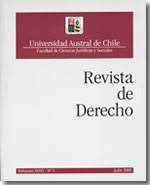Crime as a blameworthy wrong: the functional connection between criminal intention and normative knowledge in Chilean law
Main Article Content
Abstract
This article argues for a structural understanding of the doctrinal concept of crime, suggesting that we should distinguish it from the idea of the actus reus (hecho punible), thus validating the traditional definition of crime as a blameworthy wrongful action (injusto culpable). On this ground, the author reformulates the functional connection between the subjective elements of crime (mens rea) and blameworthiness, in order to specify how such connection expresses itself in the functional connection that we should acknowledge between criminal intention (dolo) and the awareness over the permissibility of the action. In this regard, the central thesis is the following proposition: only when blameworthiness implies normative knowledge can this judgment express the intentional character of the crime. Using this as a theoretical framework, the author suggests that we reinterpret the legal regulation of excusable mistakes of law, as a defence or as a mitigating factor. This solution can, in turn, be categorized as a defence of the solution that was first offered by the so called “teoría del dolo” (intent theory) through the conceptual apparatus of the “teoría de la culpabilidad” (culpability theory).

